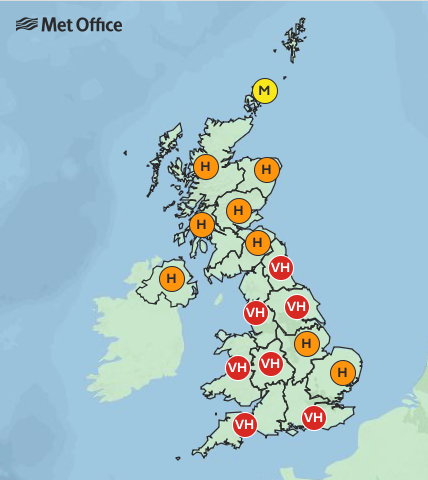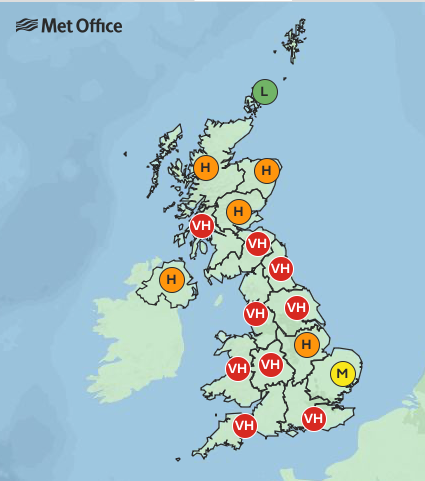Britons with hay fever should brace for itchy eyes and runny noses this week as high levels of pollen sweep across the UK.
There will be “very high” pollen counts in North East England, the North West, Yorkshire, the West Midlands, and London and the South East on Friday, forecasters say.
There are “high” pollen counts across the rest of the UK on Friday.
The Met Office’s pollen forecast also predicts very high pollen counts for much of England, Wales and Scotland on Saturday, so millions across the country can expect to be reaching for their tissues.

On Sunday, every single region in the UK except for Orkney and the Shetlands will have at least medium levels of pollen, with the majority of areas facing high or very high levels.
It comes as the third heatwave of the summer is set to hit the UK by the end of the week.

In the south of England and Wales, temperatures of up to 31C on Thursday and 32C on Friday are possible.
In the north of England, Thursday could see highs of 27C, edging up to 29C on Friday and 30C on Saturday, with isolated highs of 31C.
Why are pollen counts so high this year?
The pollen count is the number of pollen particles per cubic metre of air, with a reading of between 50 and 150 grains of grass pollen considered high.
The weather plays a significant role in levels of pollen and how it is dispersed. The Met Office says grass pollen, if temperatures reach between 18 and 28 degrees, could give a high count if it is a dry day with low humidity and a gentle breeze.
The amount of daylight, or sunlight, is also crucial to pollen production because of photosynthesis. If there is a particularly cloudy spell of weather, then plants and trees will produce less pollen because they are getting less light.

The Met Office said the UK is experiencing higher than average levels of birch pollen this year due to the ideal conditions for pollen production last spring and summer.
Recent weather conditions have also been ideal for tree pollen being released, and low rainfall has meant pollen hasn’t been washed out of the atmosphere.
How to ease hay fever symptoms
High pollen counts mean many people could experience sneezing, itchy eyes, mouth and throat and blocked noses.
More than 10 million people in Britain suffer from hay fever, according to the Met Office.
“As a sufferer, you may also experience the loss of your sense of smell, facial pain, sweating and headaches – although these symptoms are less common,” the Met Office says.
“Asthma sufferers may find that their symptoms get worse when suffering from hay fever and may experience a tight chest, shortness of breath, coughing and wheezing.”
There is no cure for hay fever, although most people can relieve their symptoms with treatment.
The forecaster says the best way to prevent allergies is to avoid exposure to pollen, but this is almost impossible during the summer months.
Many people rely on antihistamines, which can prevent allergic reactions. Some people use corticosteroids, which reduce any inflammation and swelling caused by the pollen allergy. Eye drops can also help.
If you are experiencing severe symptoms, you should speak to your GP, the Met Office says.
Mapped: Where the third UK heatwave of the summer will hit
Yellow heat health alert extended to all of England as temperatures soar
Third heatwave of summer to hit UK this weekend
How long will the third heatwave of the summer last?
What the latest NHS hospital figures for England show
Almost 1.7m children in households caught up in two-child benefit cap







